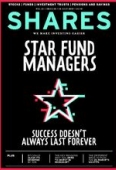Archived article
Please note that tax, investment, pension and ISA rules can change and the information and any views contained in this article may now be inaccurate.
European trust sharpens proposition in fight against passives

Fund managers are increasingly sharpening their proposition in the fight against competition from lower-cost tracker funds. Among them is John Bennett of Henderson European Focus Trust (HEFT) where the investment trust has amended its structure to give it capacity to make greater bets by holding fewer companies.
The trust has cut the minimum number of holdings it can have in the portfolio, with the so-called ‘floor’ of the fund going down from 50 to 45.
Bennett would like to lower the threshold further as the trust aims to become less like its FTSE World Europe ex-UK benchmark index. That would require approval by the board of directors and the trust’s shareholders.
By having a more concentrated portfolio, the fund would experience a greater benefit when its holdings enjoy good news as there would be less diversification to dilute the overall performance. However, this approach can work both ways and the fund could experience more pain if one of its holdings goes through a bad patch.
SPOTTING OPPORTUNITIES
Bennett doesn’t appear to be a person who is afraid of taking bold bets. After all, he welcomes negative economic news as it can present a good opportunity to invest in the market.
That attitude is fortunate given his focus on Europe where the economic headlines are particularly gloomy at present. ‘I say recession is a good thing because in recession you get bargains. You don’t get bargains when everyone says come on in, the water’s warm,’ he remarks.
Typically a value investor, Bennett’s portfolio is focused around finding high quality, Europe-based companies with share prices that are undervalued by the market.
Anyone buying this fund is getting exposure to companies that are listed in Europe but are actually active in more parts of the world.
Bennett’s message is: ‘Don’t buy Europe, buy the globe’. You may think that sounds a bit odd from someone in charge of a European fund, yet there is logic in his thinking.
The fund manager’s expertise is the European stock market and this presents his universe from which to find global companies, hence how the fund is differentiated from others labelled as more generic global products.
His view is that Europe’s economic data is not what dictates the success of companies listed in the region, and so in his opinion poor figures from countries such as Germany this year aren’t relevant to the success or failure of a business based in the continent.
BIG COMPANIES, LOW PRICES
Henderson European Focus’ top holding is Swiss firm LafargeHolcim, the world’s biggest cement company, which made up 5.9% of the fund as at 31 May 2019.
Since the two cement companies Lafarge and Holcim merged in July 2015, the combined company’s share price has fallen from around CHF70 at the time of the merger to around CHF48 today, with its bigger size effectively holding it back from being able to grow.
Bennett says he has ‘never liked cement, never liked Lafarge and never liked Holcim’. So why is it his biggest holding? ‘It’s not because it’s cement. It’s actually because one of the finest CEO and CFO teams I’ve ever met in my career are now at the helm there,’ he explains.
Under the leadership of chief executive Jan Jenisch, who joined in September 2017, the company is moving away from being a so-called ‘empire builder’ and is tilting the focus of the business away from cement and into higher growth, higher margin areas of the building materials market.
Bennett thinks the business has been damaged by being in too many countries and markets, but that there should be a turnaround in performance as it gains a narrower focus.
He adds: ‘Far too many European household names – Daimler, Siemens, Phillips and the banks – became empire builders. That is usually damaging to shareholders. Focus is usually what makes shareholders money.’
IDIOSYNCRATIC STOCK PICKING
Bennett highlights two companies which epitomise the trust’s idiosyncratic view to stock picking, focusing more on a company’s merits than the home country it is based in.
One is German manufacturer Knorr-Bremse, which makes train and truck brakes. Bennett calls it the ‘classic epitome’ of the German Mittelstand, the small and medium-sized enterprises (SMEs) which make up the backbone of the German economy.
A large number of such SMEs typically operate in niche parts of the manufacturing industry, and many have become global leaders in their respective markets.
Knorr-Bremse is one of those companies, and Bennett says its focus on two products and high market share mean it’s primed to capitalise on growth in the markets where it sells its products, and that’s not in Germany.
He says: ‘When China invests in rail (for example), there are fewer bigger beneficiaries, certainly in the listed world, than Knorr-Bremse.’
Since it listed in October 2018, the company’s share price has steadily risen from €80 to around €93 today.
The other stock Bennett highlights is Spanish pharmaceutical company Grifols, one of only a few companies in the world making blood plasma-based products.
He describes the company as a ‘very unique listed asset’ which epitomises his fund and says there are about only three to four others in the world doing what Grifols does.
‘That’s a high growth niche with high barriers to entry, which happens to be listed in Spain. That’s the type of company to me that epitomises the real European opportunity.’
While growth in its share price has been modest in the past year, the longer track record is different with the shares rising from around €6 in 2012 to currently hovering around the €27.50 mark.
Important information:
These articles are provided by Shares magazine which is published by AJ Bell Media, a part of AJ Bell. Shares is not written by AJ Bell.
Shares is provided for your general information and use and is not a personal recommendation to invest. It is not intended to be relied upon by you in making or not making any investment decisions. The investments referred to in these articles will not be suitable for all investors. If in doubt please seek appropriate independent financial advice.
Investors acting on the information in these articles do so at their own risk and AJ Bell Media and its staff do not accept liability for losses suffered by investors as a result of their investment decisions.

 magazine
magazine









